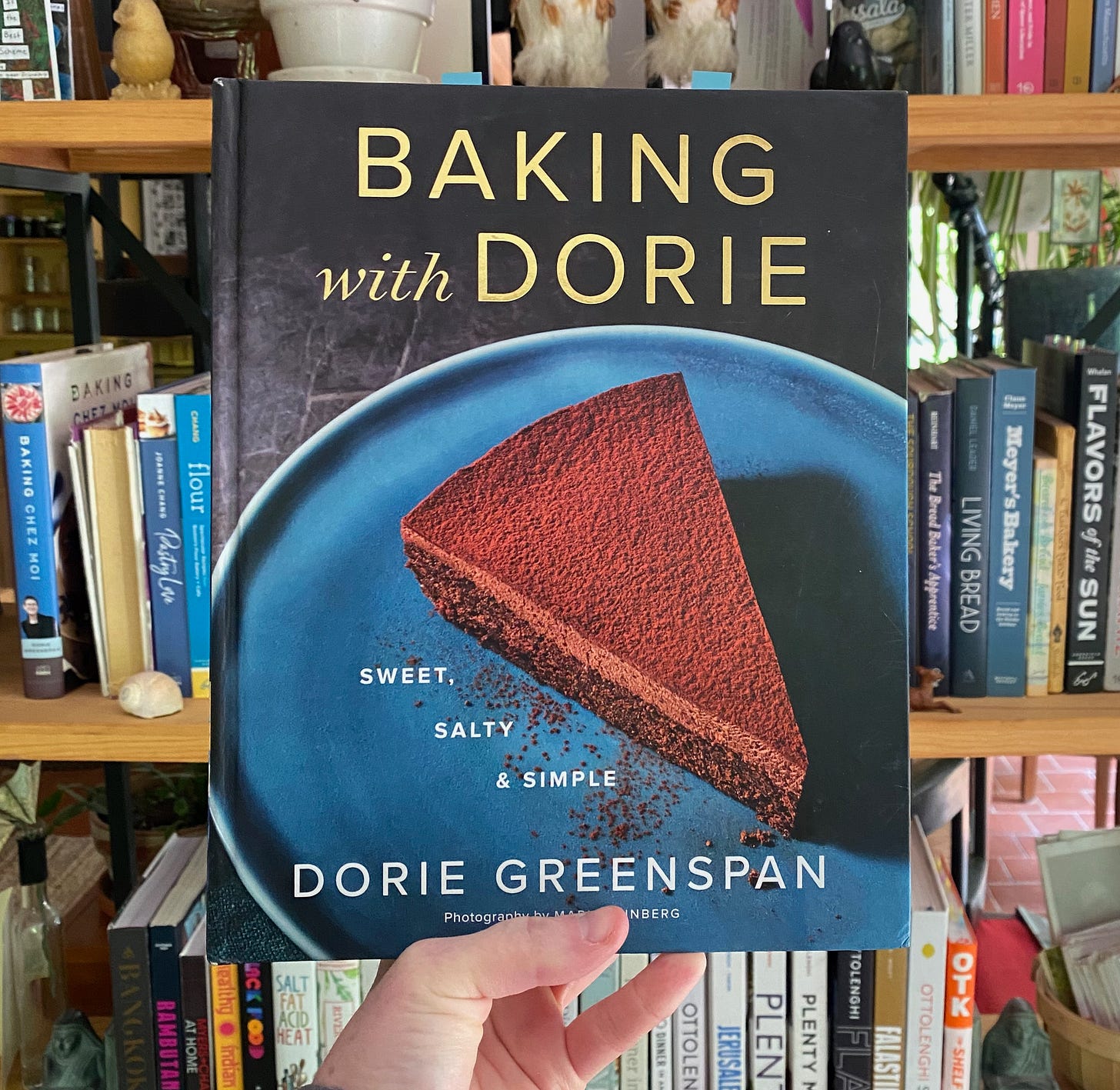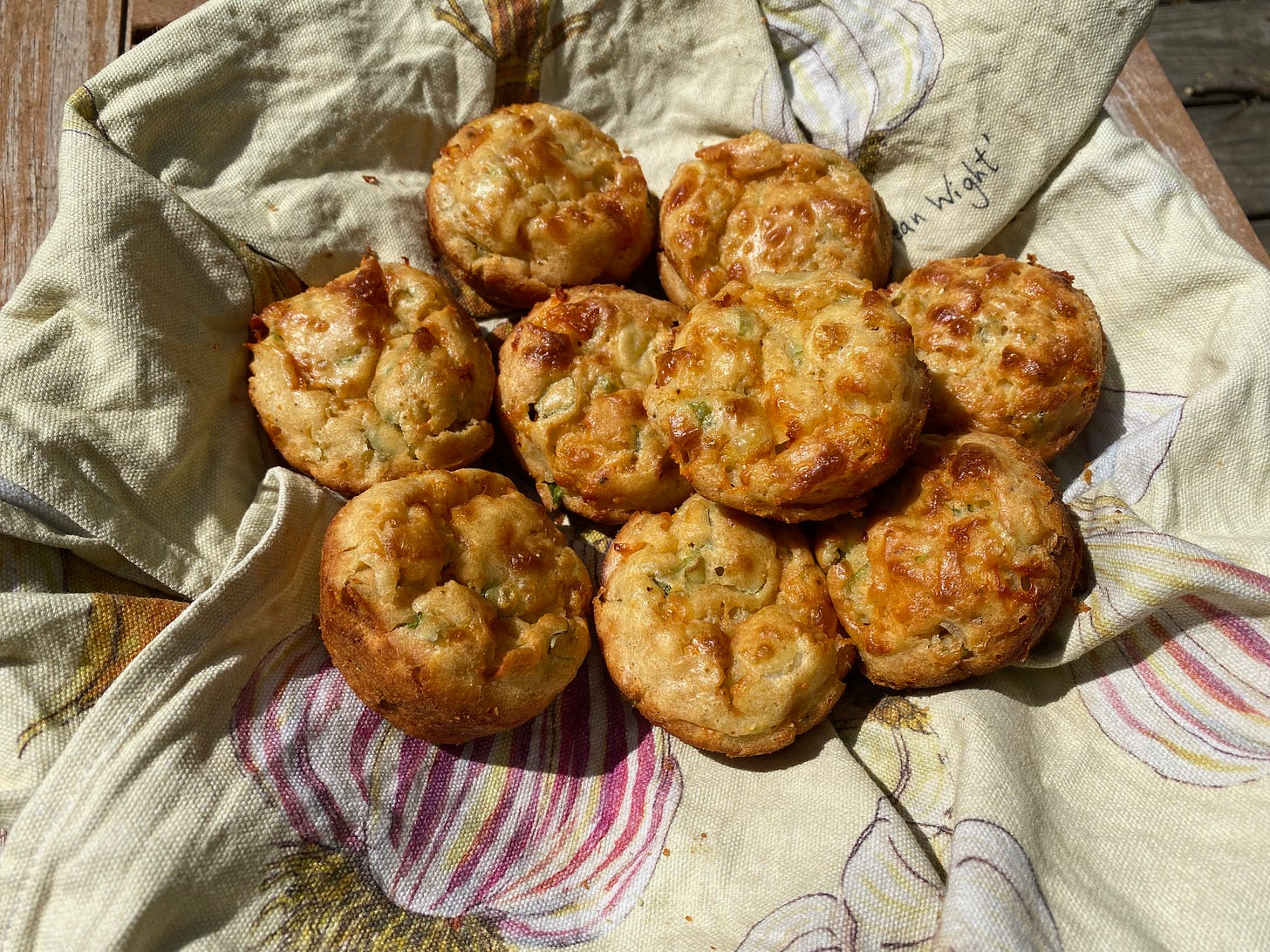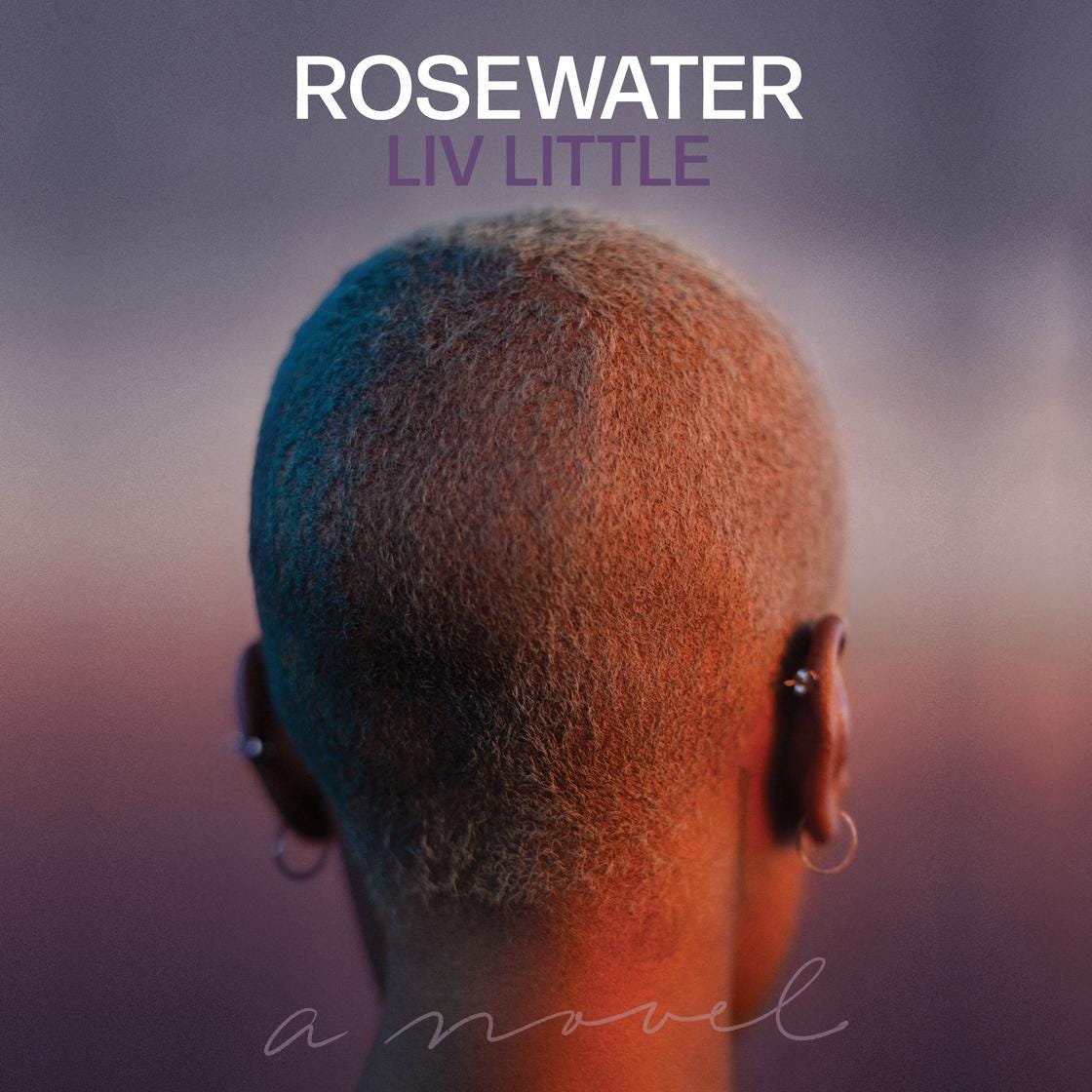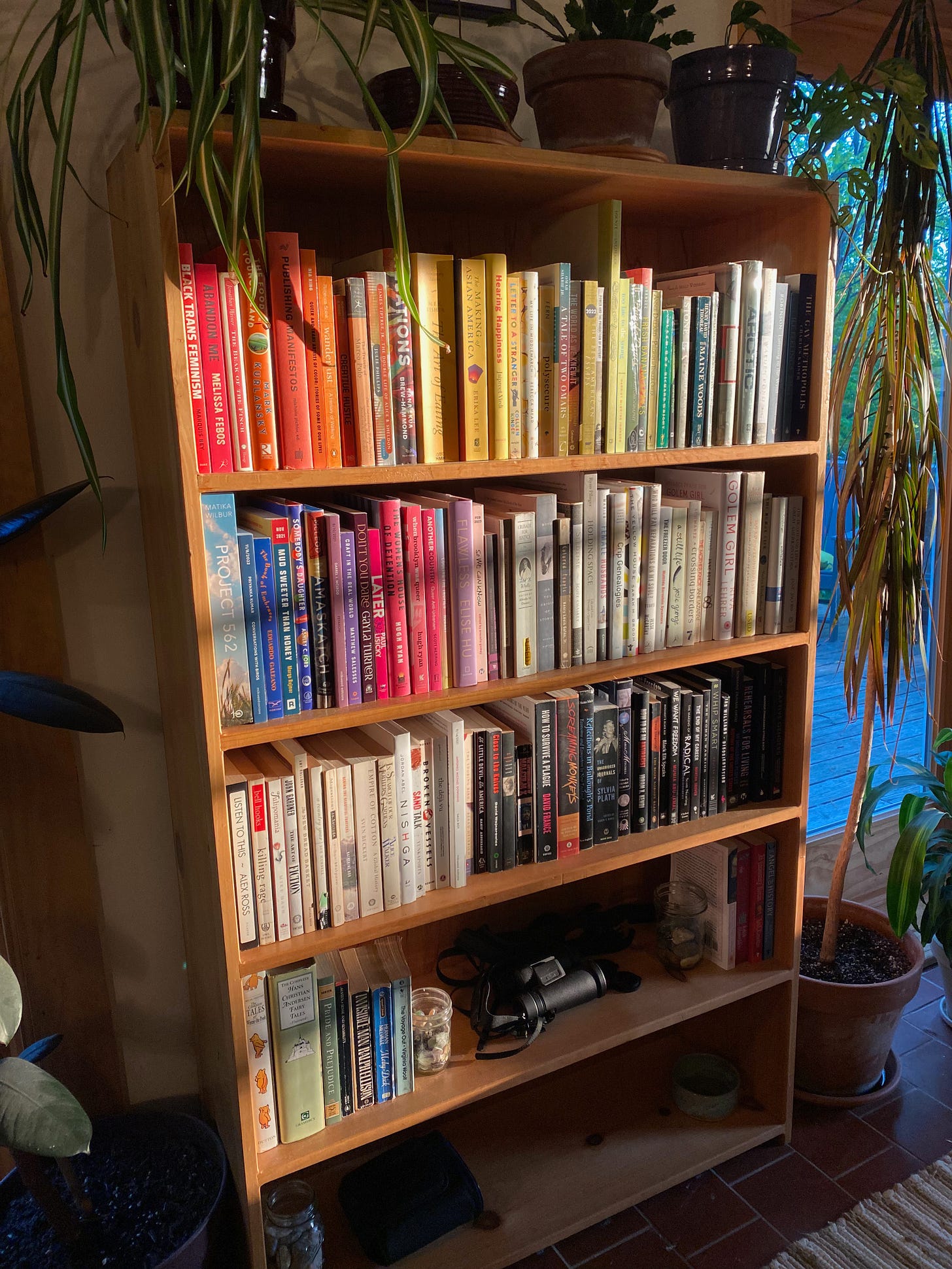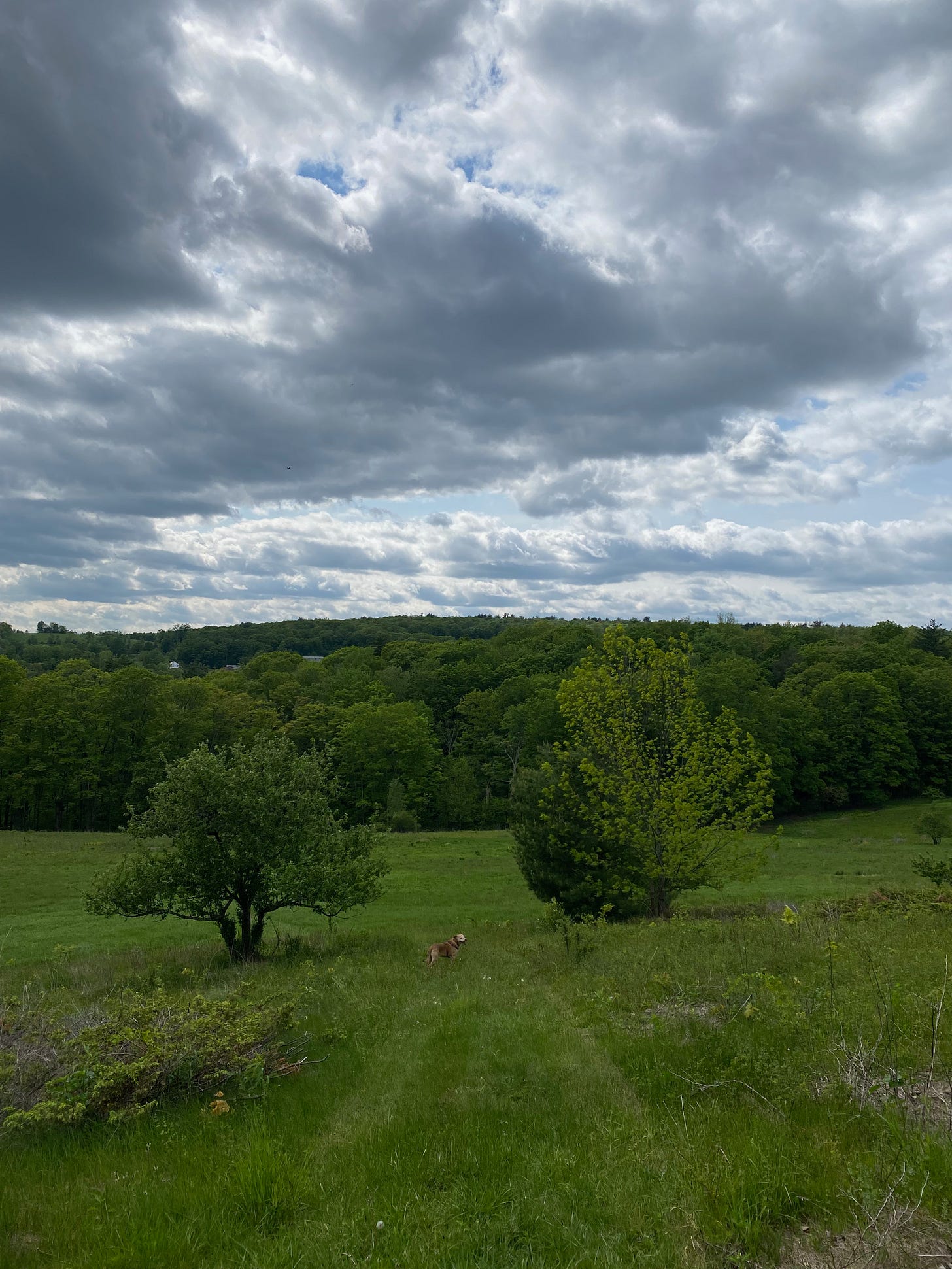Volume 3, No. 20: Queer Love Stories Don't Have to Be Romantic + Cheese Puffers
Greetings, book and treat people! Things are hard. I am struggling. Getting this newsletter out this week wasn’t easy, so thank you all for being here. It means a lot.
Because everything feels difficult and exhausting, I haven’t been reading as much as usual. Last week, instead of reading, I watched all three currently available seasons of All Creatures Great and Small on PBS. I adored the books when I was younger and the show is a joy. Who knew I would fall so hard for straight people falling in love!?! Of course, it’s mostly the animals (and gruff farmers and beautiful countryside) that make the show so good. It’s wholesome, kind, generous, and funny.
I’ve also been struggling to focus on audiobooks. I always have one going, but I’m moving through them slowly. I’ve been listening to birds on my morning walks instead. The field at the top of my road is full of bobolinks and I love them. It’s so much fun to watch them swooping around, diving in and out of the tall grass. Their song is absolutely wild—it sounds like a robot!
This is all to say that disrupting my routine has brought me a lot of joy, even if it hasn’t fixed anything.
Here’s your reminder that the Spring Sale ends on May 31st—subscribe today and get 50% off your subscription! Paid subscribers get access to the Books & Bakes Subscriber Hub (which includes a searchable index of every book I’ve reviewed), biweekly essays, and the knowledge that you’re supporting work you care about.
A few brilliant recent reads have me thinking about one of my favorite kinds of queer books: queer love stories that aren’t (necessarily) romantic. These three books mess with binary understandings of love, friendship, and romance. They’re about queer relationships that don’t adhere to neat definitions. They center queer friendship—not as something to settle for, or something that’s nice to have in addition to a romantic partner, but as the thing. I love what all of these books have to say about the expansiveness of queer relationships.
The Books
When the Angels Left the Old Country by Sacha Lamb (Historical Fiction, 2022)
What a blessing of a book! Do you need something warm and funny and full of hope? Do you need a book full of witty dialogue that will make you cackle? Do you need something very tender, very sweet, like the first taste of apples and honey on Rosh Hashanah, like the best raisin challah? Do you need a balm in the form of a book, with a dash of adventure? Do you need something bursting with hope? Something full of queer joy and Jewish silliness? Do you need something whimsical and strong?
This is a queer friendship love story about an angel and a demon, Uriel and Little Ash. Uriel (an angel) and Little Ash (a demon) have been study partners for ages, happily discussing the Talmud and arguing about Jewish theology in their shtetl somewhere in Poland (too small to even have a name). When they learn that a village woman who left for America hasn’t written home in ages, they decide to go after her to see what happened. Well, Little Ash decides, because he likes adventures and trouble and excitement. On the ship, they meet a young queer woman named Rose, who is heartbroken because her best friend just got married. She’s determined to start over in America. All three of them find a lot of trouble in turn-of-the-century New York. Lamb writes about poverty, exploitation, antisemitism, and anti-immigration and anti-union laws in early 20th century America. They paint a vivid picture of how hard life was for immigrants, but they do so without ever making the book feel too dark or overwhelming.
There are a million million things I love in this novel. The beautiful queer friendship at the heart of it, of course. Uriel and Little Ash care for each other but sometimes misunderstand and therefore hurt each other. Their intimacy is so sweet, so nourishing. I loved witnessing the ups and downs of their relationship, as they’re both figuring out who they are and how they want to be in the world. Their little jokes, their teasing, their petty grievances, their fierce loyalty—it’s all so warm. Their friendship also changes them—they influence each other. Uriel, who is nonbinary, sometimes tries on identities that don’t fit it because it thinks they will please Little Ash. Little Ash sometimes goes against his nature for the same reason. They make mistakes and have to talk it out. But I never had to worry about them. I knew they’d find their way back to each other.
But I also love all Yiddish, the Jewish history and folklore, the deep compassion with which Lamb writes about immigrant Jewish communities. I love that there’s a little bit of magic that doesn’t really feel like magic. I love all the gender play and fluidity. I love how much there is about names and the power of naming yourself. I love the Jewish lesbians (Rose isn’t the only one!) and their fierceness and their softness. I love all the different kinds of queerness and community care that exist in this novel.
This was an utter joy to read. The audiobook, narrated by Donald Corren, is perfect. I was enchanted.
Future Feeling by Joss Lake (Speculative Fiction, 2021)
What a weird and beautiful book. It’s set in some kind of future, with tech that regulates/tracks emotions, and instagram holograms (if you have enough followers), and some kind of mysterious worldwide trans organization, the Rhiz, that mines data but is also responsible for getting trans people what they need—health care, emotional support, etc.
Penfield is a trans dog walker living in New York. He’s adrift. He’s having an affair with a famous actress, living with roommates he sort of gets along with (the Witch and the Stoner-Hacker), not sure what to do with his life. He spends a lot of his time obsessing over Aiden, a fellow trans man who has millions of followers on social media, all fawning over pictures of his perfect transition, his perfect trans life. In a fit of jealousy, Pen enlists the help of his roommates to hex Aiden. But something goes wrong, and he accidentally hexes another trans man, Blithe. Blithe is sent to the Shadowlands—a mysterious emotional/spiritual/physical landscape through which all trans people must pass. They just don’t usually enter it forcibly thanks to a misplaced hex. So the Rhiz (I really cannot do justice to the strange creativity that is this caring, creepy, all-knowing, community-oriented, magical, contradictory organization) sends Aiden and Pen to retrieve Blithe and undo the hex.
I didn’t understand half of this, and who cares, this is my favorite kind of book, because it’s not about the future, and it’s not about hexes and magic and world-building. It’s a story about trans brotherhood, loneliness, alienation, trying to find your way to self-worth under capitalism, queer abundance, the inherent strangeness of certain queer feelings. It’s our world, now, sideways.
I don’t have much patience for dystopias anymore, especially ones written by white authors that are fueled by present terrors (mostly experienced by people of color, trans people, disabled people) reimagined as future terrors. I do love books like this, that don’t introduce new terrors, but bend reality just a little bit, dye the weirdness and loss and mess of this world we’re all muddling through a bright and vibrant neon.
This novel is so playful and silly, but it also interrogates the chilling realities of transphobia. In one scene, while Blithe is in the Shadowlands, an Operatrix (high priests/magicians/overlords/queens/MCs/seers) of the Rhiz talks to Blithe about his transition like this:
“Okay, time for your intake. I need to get a sense of the shape of your transition. How did it begin? This could be a vague glimmer, an ominous portent, a forbidden crack, a slimy loathing, a cold withdrawal, a green bowl—whatever form fits your experience.”
This blend of beauty and mess runs through the whole book. It’s inventive and joyful. It’s full of illogical absurdities. It’s also serious and smart and cuts right to the heart of so many truths about queer and trans lives. I love the way Lake just delves into mystery—how odd, how delightful, how hard it all is, sex and friendship and gender and interacting with other humans! I also love the commentary about trans and queer kinship—friendship, chosen family, mentorship, hookups, romantic partners, broader community—and how all of these relational dynamics have the potential for violence and for intimacy. The complicated relationships that develop between Aiden, Pen, and Blithe are so poignant and specific.
This reminded me a lot of My Volcano, another totally absurd and hilarious book about a slightly skewed future that is really about what it feels like to exist right now on this impossible planet. I felt the same way reading it: disoriented, sad, warm, hopeful.
Small Joys by Elvin James Mensah (Contemporary Fiction, 2023)
This is a funny, kindhearted, joyful, and sometimes devastating novel about Harley, a Black gay man in his early 20s. He’s just left uni, mostly due to anxiety and depression, as well as some intense familial trauma due to homophobia. He’s moved back to his small hometown where he’s working at a theatre and living with an old friend and her roommates. He’s thinking about suicide when the book opens, which is also when he meets Muddy, one of his new roommates.
The whole book is centered on the sweet friendship between Harley and Muddy. Muddy is a white dude, a year or two older than Harley. He loves birding, rugby, and the band Oasis. He seems to radiate joy and cheerfulness. There is an ease about him that feels foreign to Harley, and yet the two are drawn to each other—they are both able to be themselves around each other in ways they often aren’t around other people.
For the first little bit, I didn’t understand this friendship. But it becomes obvious early on (about a third of the way through) that Muddy is asexual. I know there are people who are going to tell me that this information is a spoiler, but a) you’re wrong, and b) I don’t care, because I don’t believe that identities can be spoilers.
Muddy doesn’t tell Harley about himself until the very end of the book. He also doesn’t label himself explicitly as ace or queer—he tells Harley he doesn’t want to have sex with anyone and never has. Of course it takes a long time for Muddy to open up to Harley! He’s scared and apprehensive. His mates have spent years teasing him about the ways he does/does not have sex. They’re always wondering if he’s gay or not. Their teasing is gentle and good-natured; they don’t see what they’re doing. But it is harmful. They do not create a safe environment for Muddy to be himself.
Harley is the only person who accepts him, and he does so before he even knows that Muddy is ace. Harley doesn’t pry or tease or think the way Muddy relates to other people is weird. The whole novel is told from Harley’s POV, so this information about Muddy’s identity isn’t available to him until Muddy tells him, but it is certainly available to the reader. Mensah is not trying to hide it.
I know queer people don’t magically bond over their queerness. But Muddy and Harley’s friendship is inherently queer. They share something—an experience of being othered, of exiting in the world in a way that’s viewed as non-normative. This is part of why they are so drawn to each other. They recognize something in each other. They don’t feel any need to label or define or dissect each other. They’re so affectionate. They cuddle. They tell each other how much they love each other. Their relationship is sometimes romantic—expansively romantic. It’s so joyful and lovely to witness.
I’m not saying that friendships between straight men can’t be like this. But in the context of these two particular people, their queer (broadly defined) identities matter. This is why I refuse to hide anyone’s identity under a spoiler tag. This is a book about a queer relationship, a queer family, and while the marketing copy splashes Harley’s queerness all over everything, it ignores Muddy’s. This says something about ace erasure in the LGBTQIA+ community. It also says something about boxes and binaries and our constant need to slot people and relationships into neat categories.
I’m not a huge fan of books about one queer character surrounded by straight people. I know lots of queer people find themselves in these situations (through rarely by choice). It is absolutely possible to write that kind of book well, and I think they’re important, but they are rarely for me. For the first few chapters, I thought this book was that, and I struggled to get into it. But as soon as I realized Harley wasn’t the only queer person around (once again, it happens early on, Mensah makes no attempt to hide it!), the whole novel clicked into place.
Also: so much wholesome birding content! So many silly jokes! A thoughtful exploration of mental health. Therapy! There’s a lot going on in this book besides the friendship, but the friendship is the heart of it. It’s not life-saving and it doesn’t fix everything in Muddy and Harley’s lives. But it does give them both the space and courage they need to choose themselves.
The Bake
Cheese Puffers from Baking with Doire by Dorie Greenspan
My love for Dorie Greenspan is no secret. I own most of her cookbooks, and one of the things I love most about them is their range. If I’m in the mood for a fancy baking project, she’s got me covered. If I’m in the mood for something super simple, she’s got me covered.
My cousin and I have a semi-regular monthly baking date where we each bake the same treat, and then eat it together while video chatting. It’s lovely! Last weekend they suggested making bialy babka from Smitten Kitchen. Theirs was beautiful! But I did not have the energy for bread, so I opened up Baking with Dorie and made these cheese puffers instead. The moral of this story is twofold: baking dates with dear ones are always worth it, and baking can be extremely easy.
These cheesy delights are a cross between a popover and a muffin. You mix up a simple batter of eggs, milk, melted butter, and flour, add a whole lot of cheese and herbs, and pop them in the oven. The result: salty, custardy, buttery goodness. They’re sort of like popovers that don’t pop, and so they feel a bit more substantial. I ate half the batch for breakfast.
Worth It?
Yes! They are so easy. You can use whatever cheese and herbs you have around. They’re the perfect “I want a luxurious weekend breakfast but I don’t want to do any work” treat.
The Bowl & The Beat
The Bowl: Chicken Tortilla Soup
It rained all day last Saturday and I reveled in it by making this delicious soup (and a rhubarb cake)! Both were perfect.
Quarter a small onion. Leave the skin on. Put it in a pot with a pound of bone-on chicken thighs. Add a head of garlic, halved across the middle, and add water to cover. Bring to a boil and then simmer for about an hour, until the chicken is tender.
Meanwhile, heat some vegetable oil in a skillet over medium heat. Fry two whole corn tortillas until golden brown and crispy, a few minutes on each side. Cut 3-5 more tortillas in strips (it depends on how many you like in yours soup) and fry the strips in batches. Layer them on a plate and sprinkle with salt while they’re still warm.
Drain the stock and return the liquid to the pot. Set the chicken aside to cool. In a blender or food processor, combine the two whole tortillas, crumbled, 1/2 cup fresh cilantro, 2 Tbs of chipotles in adobo (or substitute harissa or a jalapeño if it’s what you have), the zest and juice of one lime, 1/2 a small onion, chopped, a dash of salt, and a few cups of broth. Blend until smooth. Return the mixture to the pot.
Shred the chicken with your fingers and add it to the pot. Taste and adjust seasonings. To serve, ladle soup into bowls, and top with a pile of tortilla strips, lots of grated cheddar, fresh cilantro, and lime wedges.
The Beat: Rosewater by Liv Little, read by Suhaiyla Hippolyte
I’m about a third of the way into this and loving it so far. Elsie is a Black queer twenty-something living in London. She works at a bar but dreams of making a life as a poet. When she’s evicted from her apartment, she moves in with her childhood best friend, which leads to various emotional realizations and confrontations. So far it just feels so real and honest. Hippolyte is especially good at reading Elsie’s slam poetry.
The Bookshelf
A Portal
Last weekend I spent six hours deep cleaning my house (another refreshing break in routine). Then I sat on my couch watching the beautiful evening light on this bookshelf.
Have you experienced a beautiful interruption or disruption lately (in your reading life or your life life)? I would love to hear about it.
Around the Internet
ForAudioFile, I wrote about three audiobooks that explore the complexities of going home. My review of Notes on Her Color by Jennifer Neal is up on BookPage. The newest installment in my Award-Winning but Under-the-Radar series is up on Book Riot—this time it’s fantasy. I also made a list of some new and upcoming nonfiction and poetry by AAPI authors I’m excited about. And I wrote a primer on my favorite genre, Weird Queer. You’re welcome!
Now Out / Can’t Wait!
Next week’s newsletter will be a special edition to celebrate the beginning of Pride, featuring a massive list of my most anticipated releases for the rest of the year. So, in the spirit of being gentle with myself, I’m not highlighting any new releases this week.
Queer Your Year
News & Announcements
Here’s your reminder to come on over and talk about queer books with us in the Queer Your Year discord!
Recs!
Prompt 32: A book of science or nature writing
I’ve been craving more queer science writing ever since reading How Far the Light Reaches by Sabrina Imbler. I bought their chapbook Dyke (geology) on a whim and loved it. Exile & Pride by Eli Clare is one of my favorite books of all time and I’m definitely due for a reread! Two other beautiful books of queer nature writing I love that are highly underrated: Borealis by Aisha Sabatini Sloan and Madder: A Memoir in Weeds by Marco Wilkinson. Both are published by my fav Coffee House Press!
Prompt 33: Weird Queer
I love Weird Queer books! There are so many different kinds. Here are a few of my favorites:
For unsettling and disturbing Weird Queer: Brother Alive by Zain Khalid.
For sad and lyrical Weird Queer: Our Wives Under the Sea by Julia Armfield.
For WTF but deeply moving Weird Queer: My Volcano by John Elizabeth Stintzi.
For formally inventive and structurally bold Weird Queer: 1,000 Coils of Fear by Olivia Wenzel, tr. by Priscilla Layne.
For speculative Weird Queer: Uranians by Theodore McCombs.
For Weird Queer that will remake your world: Lote by Shola von Reinhold.
The Boost
Shit in Florida is bad. Bad, bad, don’t have words for it bad. Several local orgs have collaborated to create the Central Florida Emergency Trans Care Fund, which you can donate to here.
As always, a little bit of beauty to send you on your way: Spring is alright.
Catch you next week, bookish friends! Next week’s special edition will go out to everyone, but if you want to support my work, you can still subscribe here.





